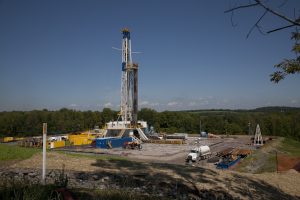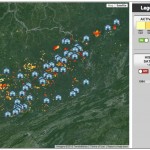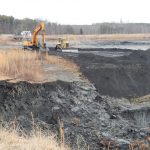Rural pulmonary rehabilitation helps patients struggling with black lung disease improve their well-being.
Blog Archives
A story found “In the Hills and Hollows”
 Filmmaker Keely Kernan is currently producing In the Hills and Hollows, a documentary feature that follows the lives of several West Virginians in the middle of the state’s natural gas boom. By juxtaposing the boom and bust coal industry that has long dominated the landscape with the current natural gas boom, Kernan hopes to promote an important conversation about the type of future West Virginians want to create.
Filmmaker Keely Kernan is currently producing In the Hills and Hollows, a documentary feature that follows the lives of several West Virginians in the middle of the state’s natural gas boom. By juxtaposing the boom and bust coal industry that has long dominated the landscape with the current natural gas boom, Kernan hopes to promote an important conversation about the type of future West Virginians want to create.
Appalachian communities are still at risk
 Our goal with Communities at Risk is to ramp up the pressure on the White House to end mountaintop removal. As citizens have argued for years, cracking down on the continuing devastation of Appalachian mountains and streams is critical to moving the region forward. It’s incumbent on the Obama administration to help revive Appalachian communities, which have powered the nation’s economic ascendancy for generations.
Our goal with Communities at Risk is to ramp up the pressure on the White House to end mountaintop removal. As citizens have argued for years, cracking down on the continuing devastation of Appalachian mountains and streams is critical to moving the region forward. It’s incumbent on the Obama administration to help revive Appalachian communities, which have powered the nation’s economic ascendancy for generations.
Reflections from the second SOAR Summit
 Last week’s SOAR Summit provided a positive forum for people working to strengthen local economies in Appalachia. But, even with so many who care deeply about the region gathering in one place, there was disappointingly little time or space created for discussion amongst the people who are doing the lion’s share of the groundwork in Appalachian communities.
Last week’s SOAR Summit provided a positive forum for people working to strengthen local economies in Appalachia. But, even with so many who care deeply about the region gathering in one place, there was disappointingly little time or space created for discussion amongst the people who are doing the lion’s share of the groundwork in Appalachian communities.
A new challenge to fracking in North Carolina
 Clean Water for North Carolina and three residents of counties where fracking could occur are challenging the authority of the state to preempt local ordinances offering communities greater protections from the practice. Dozens of North Carolina counties and towns have already passed resolutions calling on the General Assembly to hand over control, while others urge lawmakers to reinstate the ban on fracking altogether.
Clean Water for North Carolina and three residents of counties where fracking could occur are challenging the authority of the state to preempt local ordinances offering communities greater protections from the practice. Dozens of North Carolina counties and towns have already passed resolutions calling on the General Assembly to hand over control, while others urge lawmakers to reinstate the ban on fracking altogether.
Appalachian communities at growing risk from mountaintop removal
 Appalachian Voices is committed to creating a forum for citizens’ stories and sharing the most up-to-date data available about the ongoing risks the practice poses to Appalachia. Today, we’re sharing a new web tool we developed to reveal how mining continues to encroach on communities and send a resounding message that ending mountaintop removal is a must if we hope to foster economic and environmental health in Appalachia.
Appalachian Voices is committed to creating a forum for citizens’ stories and sharing the most up-to-date data available about the ongoing risks the practice poses to Appalachia. Today, we’re sharing a new web tool we developed to reveal how mining continues to encroach on communities and send a resounding message that ending mountaintop removal is a must if we hope to foster economic and environmental health in Appalachia.
Don’t drink the water

As part of coal ash law enacted in North Carolina last year, Duke Energy is required to test the well water of residents living within 1000 feet of the massive coal ash ponds that dot the state. Now, the first round of water testing results are coming back, giving residents and regulators a clear picture of just how widespread the problem is.
WV to Review Research on Mining Health Impacts
West Virginia’s Bureau of Public Health announced in March that the agency will begin working with the state’s Department of Environmental Protection to evaluate existing research that links surface coal mining and poor health.
A first for North Carolina, now open for fracking
 March 17 marked the first day in history that North Carolina has been fully open to the oil and gas industry for the dangerous, environmentally destructive practice of hydraulic fracturing for natural gas. Though the moratorium on fracking has been lifted, communities and environmental organizations across the state are prepared to continue fighting.
March 17 marked the first day in history that North Carolina has been fully open to the oil and gas industry for the dangerous, environmentally destructive practice of hydraulic fracturing for natural gas. Though the moratorium on fracking has been lifted, communities and environmental organizations across the state are prepared to continue fighting.
Criminal charges filed against Duke Energy
 The U.S. Department of Justice has filed criminal charges against Duke Energy for violating the federal Clean Water Act at coal ash sites across North Carolina. The company announced today that it has reached a plea agreement with federal prosecutors to resolve the charges that includes $102.2 million for fines and mitigation.
The U.S. Department of Justice has filed criminal charges against Duke Energy for violating the federal Clean Water Act at coal ash sites across North Carolina. The company announced today that it has reached a plea agreement with federal prosecutors to resolve the charges that includes $102.2 million for fines and mitigation.

